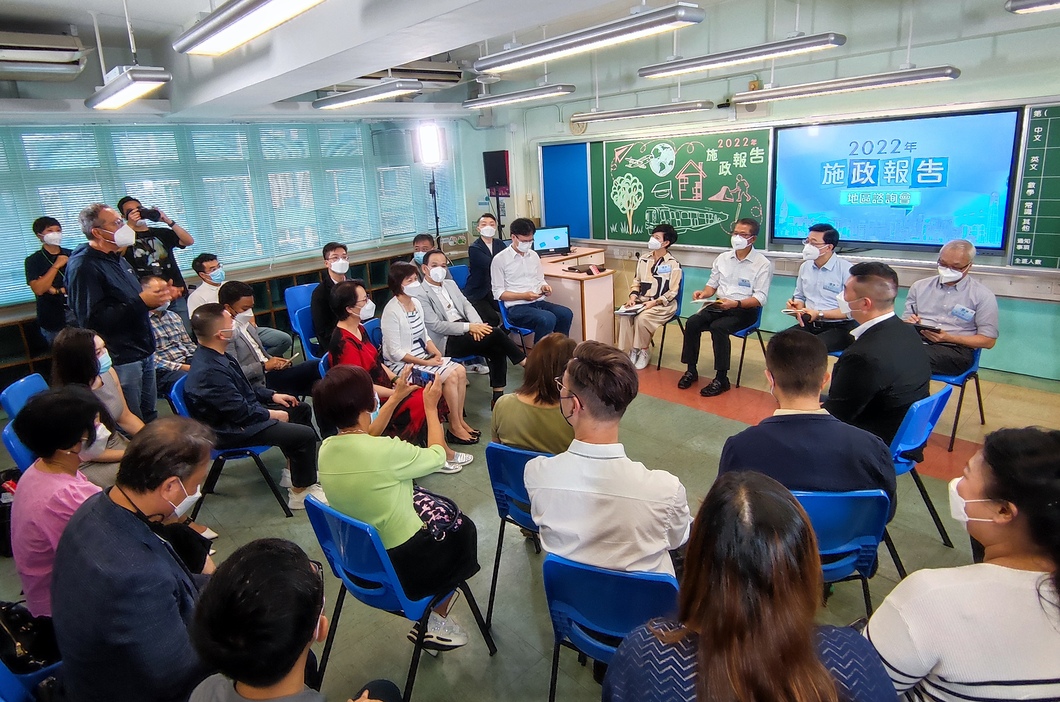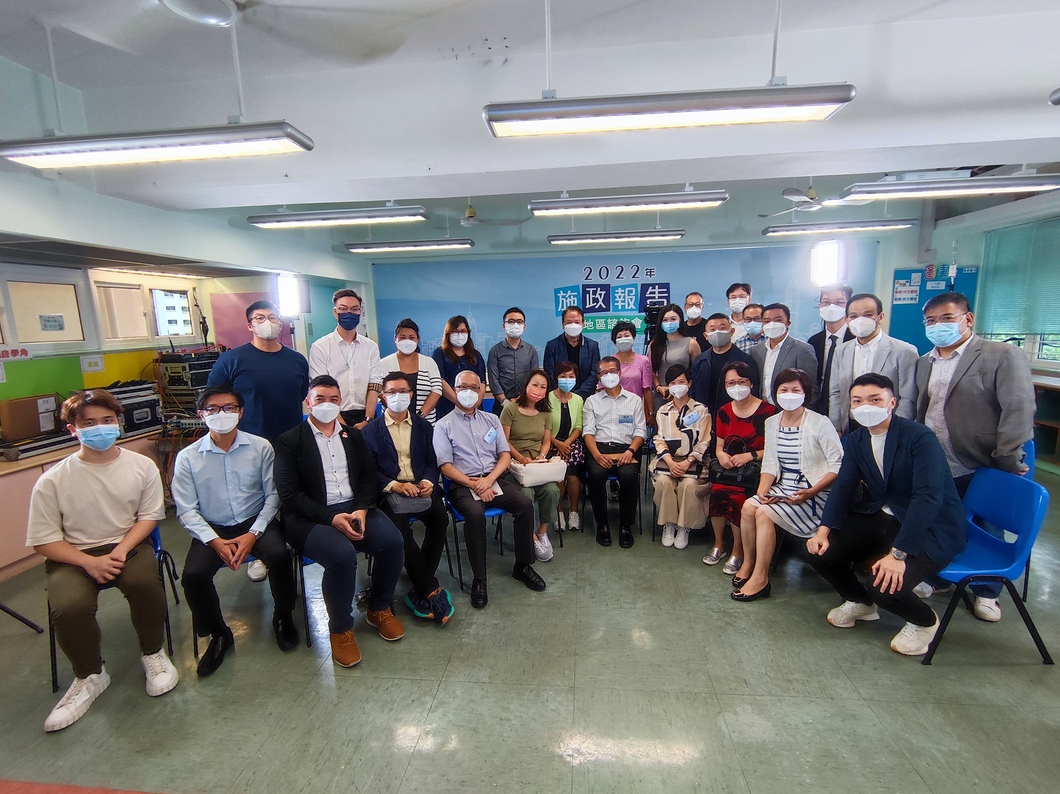Blog
Implementing Targeted Anti-epidemic Measures and Resolving Challenges Pragmatically
Following a narrower interest rate gap between HKD and USD, the selling of HKD in the market has slightly decreased recently. HKD was relatively stronger than the weak-side Convertibility Undertaking (CU) level of HK$7.85 per USD, while the aggregate balance remained at around HK$120 billion. However, there have been renewed market expectations that the US would significantly raise its interest rates, which might trigger another round of carry trades and put downward pressure on HKD.
A few days ago, US Federal Reserve Chairman Jerome Powell reiterated the importance of price stability at the Jackson Hole meeting, stating that restrictive monetary policy would be maintained for some time, and warning against prematurely loosening policy. His speech reinforced market expectations that the Fed would continue to raise interest rates aggressively at an accelerated pace, including a further 0.75% hike at the September meeting, and triggered a sharp fall in US stocks.
It is not difficult to understand the market’s concerns. If the Fed raises interest rate by another 0.75% in September, it will be the third consecutive rate hike of such level in the current cycle, bringing the total rate hike to 3% in just seven months, and raising the target range for the federal funds to 3 - 3.25%.
Any further substantial interest rate hike in the US would mean that carry trades and HKD selling interests are likely to re-emerge, while the upward pressure on HKD interest rate will also increase. However, just as we have stressed repeatedly in the past, despite the differentials between Hong Kong and US interest rates, and that carry trades had led to an increase in HKD selling interests in the past few months, total deposits in Hong Kong’s authorised institutions’(1) continued to increase by 0.4% in the first half of this year, indicating that the selling of HKD is not equal to capital outflows. An increase in HKD selling interests would not affect Hong Kong’s financial and monetary stability since interest rates differentials and carry trades are completely consistent with the expectations under the Linked Exchange Rate System.

|
| Yesterday I attended the second Policy Address District Forum with the Chief Executive and several other principal officials. |
With elevated inflation elsewhere, a weak global economy and rising interest rates, Hong Kong’s economic momentum would be adversely affected. At the same time, the worsening local epidemic situation has also raised concerns about the economic outlook. How to effectively stabilise the economy and make adjustment in response to market expectations is a major challenge at the moment.
In response to the latest epidemic situation, the Health Bureau has announced four new anti-epidemic measures under the scientific evidence- and precision-based anti-epidemic strategy to enhance our fight against the epidemic. We hope that everyone will give their full support, and encourage relatives and friends who have not yet been vaccinated to get a jab as soon as possible. The whole community needs to work together to reinforce the protective barrier against the virus, so that we could contain the epidemic effectively, and at the same time allow normal social and economic activities to continue as far as possible. This would also safeguard the operation of small, medium and large enterprises, as well as protect jobs and income.
In fact, the impact of the epidemic on Hong Kong’s competitiveness and our ties with the international market has long been a matter of concern. Our targeted anti-epidemic approach was adopted with the aim of minimising the social and economic impact while effectively putting the epidemic under control. Recently, on various occasions, including consultation sessions for the Policy Address, I have heard the views of representatives from chambers of commerce, the financial sector, small to medium enterprises etc. of different industries and backgrounds. They generally agreed that Hong Kong has unique advantages and remains an important gateway for foreign businesses to enter the Mainland market, an ideal platform for expanding their regional business, as well as a base for Mainland enterprises to enter overseas markets. Hong Kong is still very appealing to them. In his important speech on 1 July, President Xi Jinping said that the “One Country, Two Systems” principle must be adhered to in the long run and that Hong Kong’s distinctive status and advantages must be maintained. This has also reinforced their confidence in Hong Kong’s future development.
Many representatives from the financial, trade, shipping, aviation and convention and exhibition sectors indicated that Hong Kong needs to expedite the resumption of quarantine-free travel with the Mainland, and to make it more convenient to travel to and from overseas as soon as possible, as it is crucial to attract and retain talents, as well as to ensure that foreign enterprises would continue to operate and invest in Hong Kong.

|
| Yesterday I attended the second Policy Address District Forum with the Chief Executive and several other principal officials. |
At the meetings, some trade representatives also expressed the hope that the Government provide incentive measures to attract large-scale international and Mainland enterprises with strategic importance to invest in Hong Kong, with a view to driving the upgrade and restructuring of the economy and industries in Hong Kong and creating quality employment opportunities.
At the same time, quite a number of participants pointed out that in recent years, the outside world has been misled by generalisations as well as biased reports and commentaries from Western media. Misunderstandings about Hong Kong’s situation also come from the fact that many people have not visited Hong Kong for a long time because of the pandemic. As such, the Government has to step up the efforts in external promotion and tell the good stories of Hong Kong actively.
Apart from publicity and promotion work, in face of the changes in the current international political situation, it is necessary for us to further strengthen economic and trade cooperation with emerging economies, as well as to attract talents and enterprises from different regions to come to Hong Kong for development and use our quality high-end services. To date, over 100 Southeast Asian companies are listed on the Stock Exchange of Hong Kong, and the most recent one listed is a Malaysian food and beverage company. Indeed, the Association of Southeast Asian Nations (ASEAN) is the second largest trading partner of Hong Kong, accounting for 12% of Hong Kong’s merchandise trade. Under the Regional Comprehensive Economic Partnership and the Belt and Road Initiative, enterprises and capital from countries in the ASEAN as well as the Middle East will certainly be our focus as we work to enhance cooperation. As an international corporate financing centre, Hong Kong has to work to attract companies from different places and of diversified backgrounds to raise funds and expand businesses in Hong Kong.
The next five years will be a critical period for Hong Kong as we move to a new stage of development. For the moment, we must do our best to fight the epidemic, expand vaccine coverage, and do more testing. Looking ahead, we must grasp this golden period of opportunity and work hard together as a community for the high-quality development of Hong Kong, and for the society as a whole to better share the fruits of our development.
(1): Authorised institutions refer to institutions that are authorised to operate a business of taking deposits in Hong Kong under the Banking Ordinance, including licensed banks, restricted license banks, and deposit-taking companies.
August 28, 2022